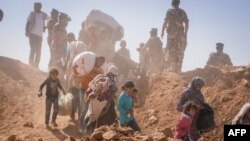Jordanian border restrictions have left hundreds of Syrians refugees stranded in a remote desert area, a leading international rights group said Wednesday, urging Jordan to let them enter the country.
About 2,500 Syrians were stuck in the remote area just inside Jordan in mid-April, the New York-based Human Rights Watch said in a report based on satellite images, aid agency reports and testimony from refugees. The number of stranded Syrians dropped to 1,000 in late May after Jordan allowed some to move out of the border zone, the report said.
The group's regional director, Nadim Houry, said that Jordan has gone to great lengths to help refugees, but that this is "no excuse to abandon newer arrivals in remote areas for weeks without effective protection and regular aid access.''
Government spokesman Mohammed Momani said Jordan "continues to adopt an open border policy'' in line with procedures worked out with the relevant international organizations.
Jordan hosts about 630,000 Syrian war refugees, out of almost 4 million who have fled their country since 2011. The Jordanian government says a total of 1.4 million Syrians live in Jordan, including those who came before 2011, and make up 20 percent of Jordan's population.
Fluctuating entry policy
Human Rights Watch said Jordan has gradually tightened entry restrictions over the past two years. Currently, two informal crossings into sparsely populated eastern Jordan — the area where the Syrians are stranded — are the only entry points for most Syrians, the group said.
The rights group said Jordan's policy has fluctuated in recent months. In October, about 4,000 Syrians were stuck in the desert area, but between December and March, Jordan allowed refugees to enter for screening and eventual transport to a closed refugee camp, the group said. It said that by March, Jordan again prevented many Syrians from entering the country.
HRW also urged the international community to assume greater responsibility for the refugees. Countries outside the region, including the United States and European Union member states, should absorb more Syrian refugees, it said. Currently, most Syrian refugees live in Jordan, Lebanon, Turkey, Iraq and Egypt.




